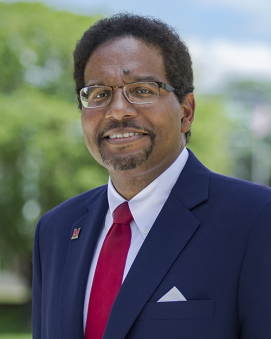DEIJ Colloquium: Dr. Darryll Pines
Reaching Underrepresented Communities Through Engineering For US All
March 31, 2023
2:00 - 3:00 PM
Joyce Cummings Center, Room 270
Dr. Darryll J. Pines, President of the University of Maryland, shared insights on engineering education and how to best engage with high school students through the NSF-sponsored Engineering for US All initiative.
Abstract:
The United States is facing a crisis in its K-12 pipeline. According to data from the National Student Clearinghouse Research Center, the percentage of US high school students enrolling directly in college in 2020 showed an “unprecedented” decline of between 4% and 10%. And while the US Bureau of Labor Statistics predicts STEM jobs will grow twice as fast as other occupations by 2029, research continues to show high school students have declining interests in STEM fields.
The gap in the US STEM pipeline is exacerbated by the large proportion of international graduates who either return overseas or work for foreign companies that compete with US companies. According to the 2020 Industrial Capabilities Report to Congress, China is producing eight times as many STEM graduates per capita as the United States (despite its population being four times as large)—and the trend continues to worsen.
It is crucial to recognize the importance of increasing and training the domestic workforce of scientists—especially engineers.
This geopolitical dilemma requires a three-pronged response. First, the United States must make continued investments in basic scientific research. Second, the country must expand the pipeline of diverse STEM graduates. And third, engineering must be a requirement for every high school student. Together, these policies are an urgent national imperative.
With a growing number of high school graduates who are first-generation immigrants, from underrepresented minority populations, or both, it is abundantly clear that the nation’s interests are best served by fueling the K–12 pipeline in ways that encourage more high school students from diverse backgrounds to pursue engineering programs. But how do educators inspire these students to discover engineering as their calling? Most students have a basic understanding that engineers “design and build things,” but possess an extremely limited sense of what engineers actually do. Aggravating matters further, many students are intimidated by the math requirements and never consider the profession for themselves.
One successful approach to expanding the K–12 pipeline is the National Science Foundation-sponsored pilot program Engineering For US All (e4usa), which seeks to bring engineering principles, skills, and design experiences into the high school curriculum. As the National Science Foundation’s Don Millard puts it, e4usa attempts to “democratize engineering for every high school student.” The program’s novel 30-week curriculum requires only high school algebra as a prerequisite and focuses on four major themes: discovering engineering, engineering and society, engineering professional skills, and engineering practice.
This presentation will discuss this program and its ability to connect to diverse population groups.
About Dr. Pines
Darryll J. Pines serves as president of the University of Maryland as well as the Glenn L. Martin Professor of Aerospace Engineering. Formerly the Nariman Farvardin Professor of Engineering and dean of UMD’s A. James Clark School of Engineering, where he has been on the faculty since 1995, Pines amassed a record of academic leadership and research accomplishments that have dramatically elevated the school’s rankings and stature nationally and internationally. In 2019, he was elected to the National Academy of Engineering for his “inspirational leadership and contributions to engineering education.”
As dean for 11 years, Pines instituted sweeping changes to improve the student experience, including revamping teaching in fundamental undergraduate courses; encouraging participation in national and international student competitions; emphasizing sustainability engineering and service learning; and expanding innovation and entrepreneurship activities. As a result of investments in targeted recruitment, advising, STEM outreach and its signature Keystone Engineering Education Program, the Clark School’s one-year undergraduate retention rate stands at 91% and its five-year graduation rate at 75%, which rank in the top 10 among public flagship universities in the United States.
Pines also made diversity a hallmark of his tenure as dean. As a co-principal investigator, the university became a National Science Foundation (NSF) ADVANCE grant recipient to further develop a culture of inclusive excellence, focused on improving work environments, retention and advancement of tenured and tenure-track women faculty in ways that improve the culture for all faculty. According to Diverse Issues in Higher Education, the Clark School ranks among the top 10 in conferring the most B.S., M.S. and Ph.D. degrees to African-American students.
Pines has testified before Congress about the importance of K-12 STEM education for all students, and led an initiative to pilot a first-of-its-kind, nationwide, pre-college course on engineering principles and design. The program, Engineering For US All (E4USA), was made possible through a $4 million NSF grant. In addition, Pines in 2015 served as chair of the National Academy of Engineering Frontiers in Engineering Education Symposium.
In recognition of his contributions to the field, Pines was named a fellow of the American Institute of Aeronautics and Astronautics, American Society of Mechanical Engineers and Institute of Physics. He chairs the Engineering Advisory Committee for NSF’s Engineering Directorate and sits on the Board of Trustees for Underwriters Laboratory not-for-profit arm. Pines received a B.S. in mechanical engineering from the University of California, Berkeley. He earned M.S. and Ph.D. degrees in mechanical engineering from the Massachusetts Institute of Technology.
